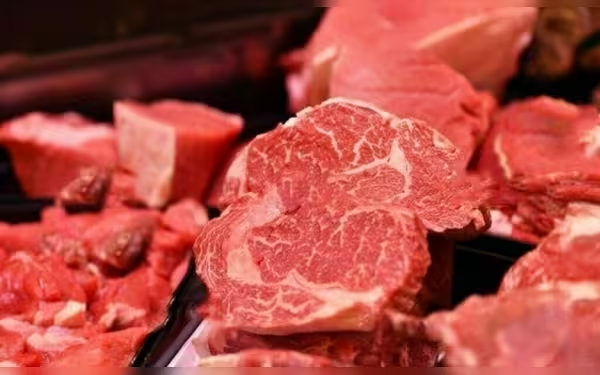Thursday, July 4, 2024 06:23 PM
Pakistan's Meat Industry Struggles to Expand Globally
- Lack of traceability systems hinders meeting international standards
- Foot and Mouth Disease poses a barrier to market access
- Dominance of small firms limits global competitiveness
 Image Credits: brecorder
Image Credits: brecorderPakistan's meat industry faces challenges like traceability, disease control, and modernization, hindering its global growth potential.
Pakistan, known for its abundant livestock population, is facing challenges in increasing its presence in the global meat trade. Despite being a top country in terms of livestock numbers, Pakistan's share in the global meat market stands at a mere 0.2 percent. This low participation is primarily due to several obstacles that hinder the industry's growth.
One of the major hurdles faced by Pakistan's meat industry is the lack of traceability systems for cattle stock. This absence makes it difficult to meet international standards and ensure quality control, which are essential for global market acceptance. Additionally, the prevalence of Foot and Mouth Disease (FMD) poses a barrier to market access, necessitating extensive vaccination programs and quarantine measures.
Outdated practices in aggregating, transporting, and slaughtering animals also hamper the industry's efficiency and quality standards. This impacts productivity and competitiveness on the international stage. Furthermore, the industry's focus on fresh and chilled carcasses rather than higher value frozen de-boned beef cuts limits its ability to cater to global consumer preferences.
Moreover, low meat yield from animals designated for meat production, along with supply chain challenges, further hinder industry growth. The existing price control regime and insufficient investment in improving meat yield contribute to inefficiencies within the sector.
Another significant issue is the dominance of small and medium-sized firms in the meat exporting industry, which face limited access to banking credit. Larger corporations receive the majority of banking credit, leaving smaller players struggling to expand and compete globally.
To overcome these challenges and enhance exports, the industry must invest in value chains, processing capabilities, and marketing strategies. Advocacy campaigns and initiatives to secure market access in potential export destinations are crucial for the industry's development and competitiveness.
Pakistan's meat industry faces various obstacles that impede its growth in the global market. Addressing issues such as traceability, disease control, modernizing practices, and supporting smaller players is essential for the industry to expand its market share and enhance competitiveness. By investing in key areas and focusing on meeting international standards, Pakistan can unlock its potential as a significant player in the global meat trade.













